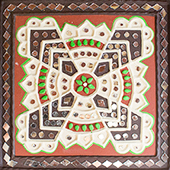The art of crafting mud-mirror work is generally known as ‘Lippan kaam’ in Western India. It is also known as Chittar kaam. The traditional mud art form embellished with mirror originated from Kutch, Gujarat. Women of Rabari community are mainly indulged in this craft but these days various communities in Kutch do mud-relief work and have their own style of lippan kaam. This mud relief work is usually done inside and outside walls of mud huts known as Bhungas. These huts are made of clay and are plastered with lippan. The word ‘lippan’ means clay or dung and the word ‘kaam’ denotes work.
Initially it was camel dung or wild ass dung used for preparing the dough that is mixed with clay. Here dung is the main binding agent of dough. The clay used for this work is mud that has been sieved thoroughly to obtain the fine particles which blends easily with the other particles. Sometimes millet was used as an alternative to dung while the dung attracts termites but the husk does not. But these days instead of dung and millet, either saw dust or chalk powder is used. Usually lippan work is retained to be white so once the clay is dried that is stuck on the wooden panel, a layer of white clay was painted over the artwork. This white clay is from the sand of marshland that is rich in salt content. Though the lippan kaam is of white color yet now a days the shades of red, green and blue are painted on the dried clay work.
The artisans of lippan kaam at Kutch are so experienced that they do not tend to draw any design or pattern on the wooden panel before starting the work. They divide the area of the wooden panel into halves with vertical and horizontal lines. According to these areal divisions the design is also mentally split into sections and the lippan kaam is done directly on wooden panel and also on the walls of houses. But before doing the lippan work on wall, the wall is given a clay base and the surface is roughened upon which the lippan work is carried away.
The graceful motifs of mud-mirror work are usually peacocks, camels, elephants, mango trees, symbolic temples, joyous women churning buttermilk, water bearing women, and other daily activities of the life in Kutch. Usually the designs of lippan kaam mostly freehand drawings yet they mainly consist of geometric forms and shapes. The mud- mirror work is elaborately done on walls, partitions, ceilings, doorways, niches and floors. Earlier the dung used for this work was pungent-smelling but the new materials like chalk powder, sawdust instead of dung and the plywood or hardboard used for base is helping mud-mirror work spread across geographies. In the contemporary world as the mud-mirror work is available in frames/wooden panels, the art finds a new place in the modern workplaces/homes in the form of a wall décor. The specialty of this new medium is they are absolutely handmade mud-mirror work yet they are very durable, washable, non-breakable and waterproof.
Some of the artisans at Bhuj, Kutch who are still practicing mud-mirror work for their livelihood and have adopted the new materials in their artwork are Neethalal Rathod and Rachana Giridharlal Rathod. The duo of mother and daughter run a company of mud-mirror works from past eight years but since two years the company is being run well due to the support given by the government. Their participation in Rann Utsav that is held every year in Kutch, Gujarat led them takeover the business in wide range. This famed them and endorsed them to earn nearly 35-40 thousand. The company is run with total of five members. Along with the duo of mother and daughter there are three more workers who are assisting the duo in completing the order works. The specialty of these artisans is they prepare the dough only with the mixture of clay and chalk powder along with the adhesive.
Irfan from Bhuj is another artisan who is well versed for his works on mud-mirror painting. He has an experience of fourteen years in the field of mud mirror work. Initially he was trained by his grandparent for four months to learn mud mirror work later due to his personal interest he continued this work for his livelihood. Now he earns an amount of 5-10 thousand every day. The specialty of this artist’s work is, the dough is prepared using pottery clay, fine saw dust, adhesive and chalk powder. He has also worked on the walls preparing lippan work on it for his clients in Bengaluru, Mumbai and Ahmedabad.





